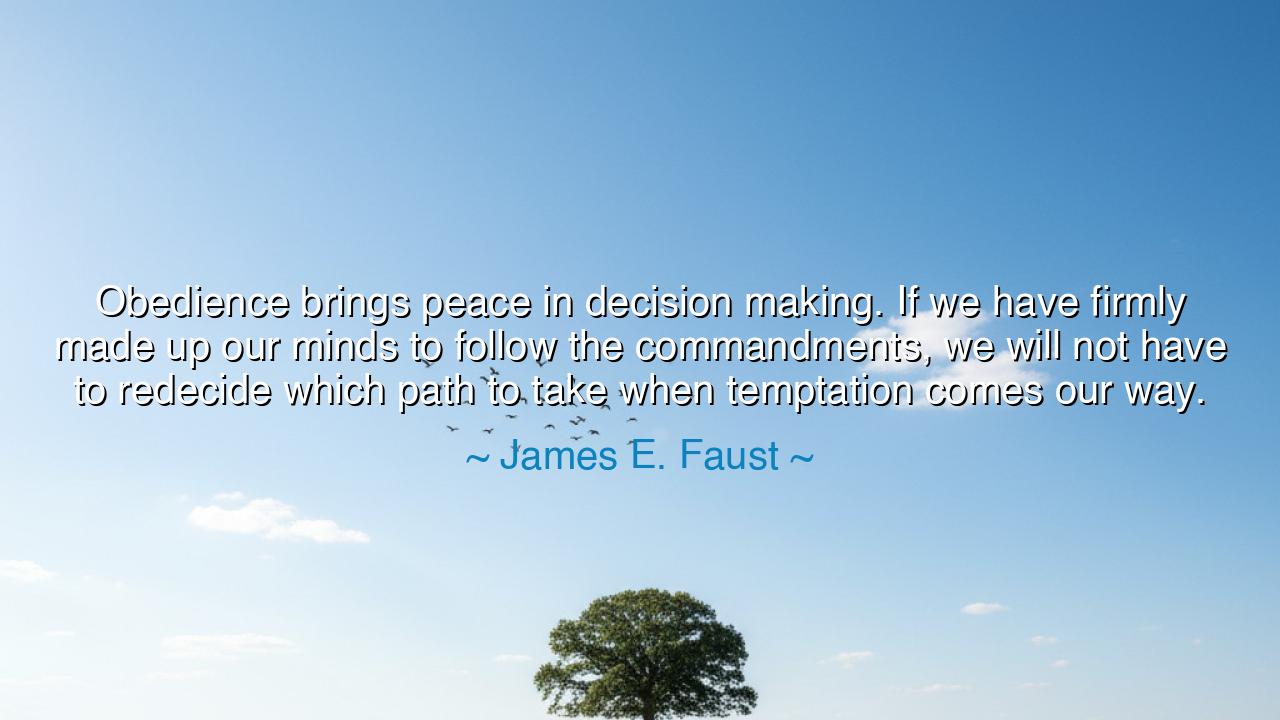
Obedience brings peace in decision making. If we have firmly
Obedience brings peace in decision making. If we have firmly made up our minds to follow the commandments, we will not have to redecide which path to take when temptation comes our way.






“Obedience brings peace in decision making. If we have firmly made up our minds to follow the commandments, we will not have to redecide which path to take when temptation comes our way.” Thus spoke James E. Faust, and in his words there is a wisdom older than empires, the wisdom of clarity, of conviction, of standing firm against the storms of desire. For when the heart is divided, when choices must be wrestled anew with every temptation, the soul is restless, like a ship tossed without anchor. But when one has already chosen the path of obedience, when one’s mind is firmly fixed upon the light of principle, then peace descends, and decisions are no longer a battlefield, but a simple remembrance of what has already been decided.
The ancients understood this well. Consider the tale of Daniel, who in the courts of Babylon was commanded to forsake the law of his God and eat of the king’s meat. He did not waver, he did not redecide; his course had long been set. Because his obedience was fixed before the trial came, his spirit stood unshaken when the moment of testing arrived. This is the peace Faust speaks of: the peace that comes when choices are already resolved in the heart, long before the trial of fire. Without such resolve, every temptation is a war; with it, temptation becomes powerless.
So too do we see the opposite in the lives of those who live without anchor. Think of the Roman general Mark Antony, torn between duty to his empire and passion for Cleopatra. He had not firmly chosen the path of discipline, and thus when temptation came, he faltered. His indecision led not to peace, but to ruin—for himself, for his armies, for the empire he might have led to greatness. His tragedy teaches the counterpoint of Faust’s wisdom: where obedience is absent, the soul must endlessly redecide, and in that endless wavering lies destruction.
Faust’s words remind us that commandments—whether divine or moral principles—are not chains to bind us, but foundations to steady us. For the man who lives without principles is like one who must build a house anew each day, wearying himself in confusion. But the one who has resolved once and for all to walk in the way of righteousness awakens each morning with strength, his course already set. Obedience may seem a limitation, but in truth it is a liberation, freeing the mind from constant turmoil and allowing the spirit to rest in peace.
History shines also with the example of the early Christians, who under Roman persecution were commanded to renounce their faith or die. Many did not waver, for their choice had been made before the sword was drawn. Their obedience gave them peace even in the face of death. Though the world saw them as defeated, their serenity revealed the deeper victory. For to live in obedience is to already know your answer, even before the question is asked. That is the strength of conviction, the stillness that triumphs over fear.
The lesson for us is clear: decide now, before the hour of trial, what kind of person you will be. If you wait until temptation arrives, you will be weak, tossed about by doubt. But if you set your heart firmly upon your values, then every trial will find you already victorious. This is what Faust means when he says that obedience brings peace—the peace of a settled heart, of a mind not at war with itself, of a soul that knows where it stands.
Practical actions follow. Reflect deeply on your own commandments—the principles you will not betray. Write them down. Commit to them in quiet moments, so that in loud moments you will not falter. Teach your children to set their hearts early upon the path of virtue, so they will not be torn by indecision later. And when temptation does come, as it surely will, remember that you need not redecide—you have already chosen. Walk forward with peace, for your path is already lit.
Thus Faust’s words stand as a shield against confusion. Obedience is not the loss of freedom, but the very foundation of it, for it frees us from the tyranny of endless choice. To know your course is to walk in peace. And so I say to you: choose once, choose well, and let obedience carry you through the storms of life. For when the heart is firm, temptation has no power, and peace shall be your constant companion.






AAdministratorAdministrator
Welcome, honored guests. Please leave a comment, we will respond soon